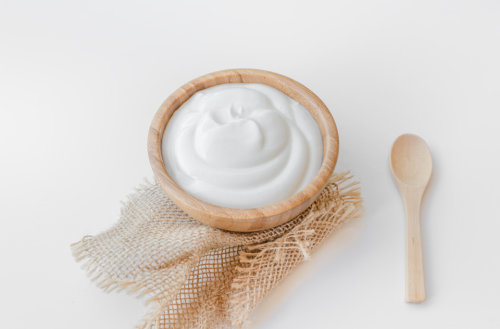Food Facts Friday: Greek Yogurt

Greek yogurt is a protein-packed food that has become quite popular in recent years. The question is, can you eat it if you have kidney disease? Let’s break down exactly what Greek yogurt is and how it can fit into a kidney-friendly diet.
Greek Yogurt vs. Regular Yogurt
What makes Greek yogurt different from regular yogurt? Both are fermented dairy products, but Greek yogurt is strained more times to make it thicker than regular yogurt. It takes more milk to make Greek yogurt, which is why it is higher in protein compared to regular yogurt.
The nutrient content of Greek yogurt can vary between manufacturers, but on average, a 5.3 oz container of plain, nonfat Greek yogurt contains:
- Calories: 95
- Carbohydrates: 6 grams (g)
- Protein: 16 g
- Fat: 0 g
- Calcium: 173 milligrams (mg)
- Phosphorus: 212 mg
- Potassium: 220 mg
Does Greek Yogurt Fit in a Kidney-Friendly Diet?
Greek yogurt is high in phosphorus and potassium, which some people with kidney disease need to limit in their diet. However, it is also a good source of protein, which people on dialysis need. Protein sources contain phosphorus naturally, so a good guide to use is the phosphorus-to-protein ratio. The lower the ratio, the better. This means when it comes to foods high in phosphorus, it is better to choose a food that is also high in protein, rather than choosing an item like cola soda. Cola sodas are high in phosphorus, but contain no protein. Ideally, it is suggested to eat foods with a ratio of 10-12 mg phosphorus/g of protein or less. Most Greek yogurts have a ratio of about 13-15 mg/g. This is a little higher than the goal of 10 mg/g, but lower than most other dairy products, which have a ratio of 20 mg/g.
Besides providing a good source of protein, Greek yogurt contains other beneficial nutrients. Most yogurts contain probiotics, which are good bacteria that may support a healthy digestive system. Look for yogurts with a “live and active cultures” label. Greek yogurt is also rich in vitamin B12. People on dialysis usually take a B vitamin supplement due to losing B vitamins through the dialysis process. B12 is important for blood cell formation, nervous system function and energy production.
Talk with your dietitian about including Greek yogurt in your diet!
Ways to Enjoy Greek Yogurt
- Add berries or other low-potassium fruits (if you need to limit your potassium intake) for a delicious breakfast or snack.
- Use it in place of sour cream.
- Add it to smoothies.
- Use it in place of mayonnaise in chicken and tuna salads.
- Use it as a base for sweet or savory dips.
- Try these DaVita recipes:
References:
- USDA Food Data Central: Yogurt, Greek, plain, nonfat. https://fdc.nal.usda.gov/fdc-app.html#/food-details/330137/nutrients.
- Considering Greek Yogurt for Chronic Kidney Disease. Journal of Renal Nutrition. Stall, Sharon. 2012; 22 (6):e57-e62. https://www.jrnjournal.org/action/showPdf?pii=S1051-2276%2812%2900180-X.
- 6 Fantastic Health Benefits of Greek Yogurt. Healthline. Kubala, Jillian. Updated on October 27, 2021. Accessed on March 30, 2022. https://www.healthline.com/nutrition/greek-yogurt-benefits.
Additional Kidney Diet Resources
Visit DaVita.com and explore these diet and nutrition resources:
DaVita Kidney-Friendly Recipes
This article is for informational purposes only and is not a substitute for medical advice or treatment. Consult your physician and dietitian regarding your specific diagnosis, treatment, diet and health questions.

Recent Comments